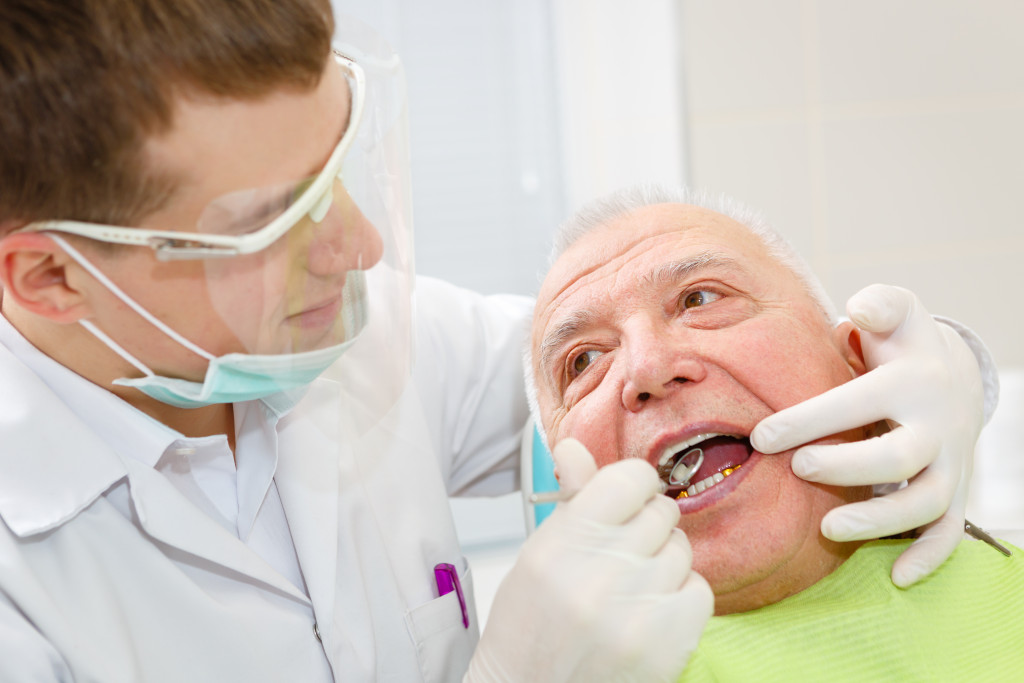Your bodies go through a lot of changes as you age. You might not be as agile as you once were. You might need reading glasses to see small print. Among the other changes inevitable with age, your teeth and gums go through changes, too.
How Does Aging Affect Dental Health?
Aging can affect your dental health in many ways. For one thing, your teeth can become more yellow or stained. This is due to a combination of factors, including the thinning of your enamel (the hard outer coating of the tooth) and a reduction in saliva production. Saliva is nature’s way of washing away food particles and bacteria, so a decrease in saliva production can increase plaque buildup on the teeth.
Your gums can start to recede as you grow older. This happens because the gum tissue gets weaker and pulls away from the teeth. When this happens, it’s easier for plaque and tartar (hardened plaque) to build up around the gum line, which can eventually lead to gum disease.
Teeth loss is also a common concern among older adults. According to research, about one in five adults would have lost all their teeth by age 65. Tooth loss can happen for many reasons, including gum disease, tooth decay, and injury.
What Can You Do to Maintain Good Dental Health as You Age?
There are steps you can take to maintain good dental health as you age. This involves continuing good oral care, which includes regular flossing, brushing, and professional teeth cleaning. Don’t forget about seeing your dentist regularly for checkups.
Most experts recommend seeing your dentist at least once every six months. However, if you have concerns about your dental health or notice any changes in your mouth, don’t hesitate to make an appointment sooner.
Don’t forget the power of staying hydrated, eating a healthy diet, and quitting smoking. These simply healthy lifestyle habits can do wonders for your dental health.
Aging doesn’t have to mean bad dental health. By taking good care of your teeth and gums and seeing your dentist regularly, you can maintain a healthy smile for years.
Other Oral Care Tips For Seniors

In addition to the above tips, here are a few more that can help seniors maintain good oral health:
Use an Electric Toothbrush
Regular toothbrushes with soft bristles can be effective in cleaning teeth. However, electric toothbrushes can be even more effective, especially for seniors with arthritis or other conditions that make it difficult to brush properly.
Investing in an electric toothbrush will make it easier for you to brush thoroughly and reach all the nooks and crannies in your mouth. Be sure to look for a toothbrush with different settings to find one that’s comfortable for you to use.
Find Ways to Floss Daily
Flossing is crucial for getting rid of plaque and bacteria in hard-to-reach places in your mouth. If you find it difficult to floss with regular floss, several alternatives can make the process easier.
Floss holders can help make it easier to get the floss in between your teeth. Water flossers, o the other hand, use a stream of water to remove plaque and bacteria. These can be especially helpful for seniors having a hard time flossing their teeth.
Use Mouthwash Regularly
Mouthwash is another helpful tool for keeping your mouth clean. It can reach places that your toothbrush and floss can’t.
When choosing a mouthwash, look for an alcohol-free one. Alcohol-based mouthwashes will help to prevent tooth decay.
Stimulate Saliva Production
Your body produces less saliva as you age. This can lead to some problems, including an increased risk of cavities. If you find yourself often experiencing dry mouth, consider chewing sugar-free gum and sucking on hard candy. You can also try using a mouth rinse that contains xylitol, which can help to stimulate saliva production.
You can also try using a humidifier at night to help keep your mouth moist. You can reduce your risk of cavities and other dental problems by stimulating saliva production and keeping your mouth hydrated.
Replace Missing Teeth
If you have missing teeth, it’s vital to replace them. There are a number of options for replacing missing teeth, including dental implants, bridges, and partial dentures. Talk to your dentist about which option is best for you.
Dental implants are usually the best choice for maintaining oral health. These also look more natural compared to other teeth replacement options, bring back function to your mouth, improve your overall health, and can last a lifetime if well cared for. The good news is, implants are just as effective in seniors.
You only need to find a dental clinic with licensed experts specializing in implant dentistry. There are many reputable dental clinics with excellent reviews you can find online. It also helps to ask your loved ones for recommendations and compare pricing before making a decision.
Aging doesn’t have to mean bad dental health. By taking oral health to heart, you can catch any dental problems early and prevent them from becoming more serious. By following the above tips, you can maintain good dental health as you age.